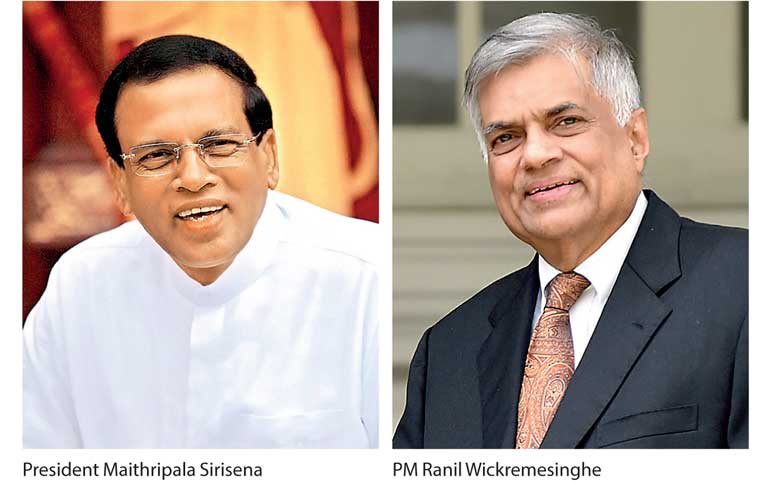Saturday Feb 21, 2026
Saturday Feb 21, 2026
Wednesday, 21 February 2018 00:00 - - {{hitsCtrl.values.hits}}

 Soon after the results of the Local Government bodies were released, it was reported that the President wanted the resignation of the Prime Minister, indicating that he cannot work with the PM any more. In return, the UNP insisted that the leader of their party Ranil Wickremesinghe should be the Prime Minister. Hence, it was further reported that the members of the SLFP were negotiating with the members of the Joint Opposition to form a Government. Ranil Wickremesinghe said at a press conference that he would continue as the Prime Minister in accordance with the constitution. He further said that rather than having a UNP Government, it is his view to continue the present Government. Impasse continues.
Soon after the results of the Local Government bodies were released, it was reported that the President wanted the resignation of the Prime Minister, indicating that he cannot work with the PM any more. In return, the UNP insisted that the leader of their party Ranil Wickremesinghe should be the Prime Minister. Hence, it was further reported that the members of the SLFP were negotiating with the members of the Joint Opposition to form a Government. Ranil Wickremesinghe said at a press conference that he would continue as the Prime Minister in accordance with the constitution. He further said that rather than having a UNP Government, it is his view to continue the present Government. Impasse continues.
Ranil Wickremesinghe was the first to bring the idea of National Government. The UNP, when they were in the opposition, has given an outline of a future Constitution and they have taken it throughout the country. In relation to the Provincial Councils, it was proposed that the Member who commands the majority of a Provincial Council shall be appointed as the Chief Minister, and the leader of the political party which has secured the next highest number of seats shall be appointed as the Deputy Chief Minister. Under Executive there were two options, and under the second option it was stated that as a novel system, the executive powers will be exercised on apolitical basis and were to be subject to checks and balances.
“The Head of State will be the Head of the Council of State (which will consist of the Prime Minister, Leader of the Opposition, the Leaders of the political parties represented in the Parliament and the Chief Ministers of the Provinces), and will act on the advice of the Council of State.”
“The decisions of the Council of State shall be by consensus. In the event of there being no consensus the majority decision will prevail. This will pave the way to practice Lord Buddha’s preaching on governance – peaceful assembly, peaceful dialogue and peaceful dispersion.”
This thinking of taking decisions by consensus was extended to the 100 day program as well. After the presidential election, MPs of the SLFP were trying to cross over to the UNP. This was not encouraged by the UNP, contrary to the practices followed by the previous administrations. In addition to that, the leadership of SLFP was given to the President and he accepted it. Thereby, he created his own powerbase, contrary to the position of a nonpartisan President.
At the General Election, it was mentioned that the two main parties would govern the country together in order to establish long-term policies, to find out a solution to the ethnic problem, and to have a new constitution. Taking into account the past experiences, UNP could have formed a Government alone if they wished to do so. The option of taking members from the SLFP was exercised because of the pledge to have a Unity Government.
Sri Lanka was in dire straits in relation to nation building. The country faced a thirty year civil war and prior to that, there were two insurgencies in the South. There were no concrete solutions given for those issues. Society, by and large, tended to forget these issues, rather than take actions to eradicate the root causes. Politicians continuously placed the agendas of their own parties ahead of the national interest. Therefore, it was mandatory to have a Government of consensus in order to find solutions to the problems faced by the country. This is the available democratic way to function. Even at this juncture, the Joint Opposition played the same role played by the preceding Opposition parties of the country, to obstruct the solutions to national level problems.
Political scientists opposed this unorthodox way of functioning of the Government. It was questioned who is going to play the role of the Opposition, which is mandatory in Parliamentary democracy. The role of the Opposition was played by the part of the SLFP, which opposed the way of the party leader. At the ground level, people were confused, and at the top level, policymakers were confused. At the ground level, members of the UNP were not able to exercise authority, although they won the elections. Defeated members of the SLFP were still in power thanks to the Unity Government. After winning an election after so many years, ordinary party supporters of UNP were not able to enjoy that victory. At the top level, it was reported and complained that the necessary power was not granted to the ministers of the SLFP.
At the end, there was no solution to the ethnic problem and no constitution was passed. The long-term policy decisions taken by the UNP were opposed by the SLFP. It looks like they have supported those policies since they were in the Unity Government.
The accusation of the President to the Prime Minister was that PM did not listen to him and PM has taken the Government forward based on his wishes. That is why the President insists on the resignation of the Prime Minister which created the present political impasse.
UNP is the majority party of the Parliament. Until such time they do not command that majority, Prime Minister would not resign. It is also not ethical to demand the resignation of leader of another party. It is to be decided by the UNP. If UNP can continue the command of the majority of the parliament, they can continue even without the support of the SLFP and Joint Opposition. Similar practice was exercised when UNP was in power when Chandrika Kumaratunga was the President.
Tenure of the office of the Prime Minister is clear in the Article 46 (2) of the Constitution: “The Prime Minister shall continue to hold office throughout the period during which the Cabinet of Ministers continues to function under the provisions of the Constitution unless he– (a) resigns his office by a writing under his hand addressed to the President; or (b) ceases to be a Member of Parliament.”
It is presently debated whether Prime Minister can be removed based on the words “during which the Cabinet of Ministers continues to function under the provisions of the Constitution”. That is why we need a new Constitution with a clear vision, rather than having patchworks to the existing one.
However the issue is this: the Unity Government was formed with certain objectives. It failed so far to achieve those objectives to a great extent. Apart from the solutions to the ethnic problem, and forming of a new Constitution, the Prime Minister and the UNP was not able to convince the SLFP-led inward thinkers that the economic policies advocated by the UNP are the most suitable to Sri Lanka at this juncture. Maybe some more time is needed for the debate, but by the time we resolve it we would have missed the bus.
The way of governing of the Unity Government was consensus but the two leaders now have disagreement. How can they betray the very foundation of the Unity Government at personal level? This is at a very deep level since one wants the other to leave. This in itself would be a good reason to dissolve the Unity Government. But it cannot be done due to Constitutional restraints.
If the leaders cannot solve their own problems, how can they give solutions to the issues at hand? If they cannot discuss and agree, how can they discuss with others and give far reaching solutions to burning issues of the country? Personalities should not clash to this level.
Therefore they should be mindful to the present moment and have a frank discussion to solve their attitudinal problems. Those should not be exposed to the nation and to the world at large. Finding out the reasons for the loss at the elections and taking corrective actions are secondary.